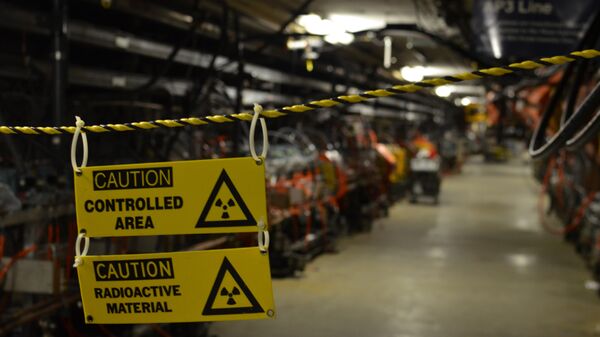Newly released documents describe "the theft of a highly dangerous radioactive source of Ir-192 with highly radioactive activity belong to SGS from a depot belonging to Weatherford in the Rafidhia area of Basra province."
Weatherford is a US oilfield services company, and SGS is based in Istanbul.
"We are afraid the radioactive element will fall into the hands of Daesh," a senior security official with knowledge of the theft said, speaking on condition of anonymity. "They could simply attach it to explosives to make a dirty bomb."
Sidestepping the complex fission necessary to create a nuclear weapon, a dirty bomb uses nuclear material in a conventional bomb format to contaminate an area.
Kept in a case roughly the size of a laptop, the material is considered a Category 2 radioactive by the International Atomic Energy Agency, and is used to test flaws in oil and gas pipelines. One official claimed that the case contained 10 grams of Ir-182 in capsule form.
There are currently no leads in the disappearance, and no indication that the material has, in fact, fallen into the hands of the terrorist group, but all evidence points to an inside job.
"[There were] no broken locks, no smashed doors and no evidence of forced entry," the official said.
Earlier on Wednesday, reports surfaced that Belgian authorities had uncovered video that proved the Paris attackers had "greater ambitions" of conducting a nuclear attack in Europe. Discovered during a raid on the apartment of one of the suspects, the video consisted of ten hours of secretly recorded footage showing the home of the director of a Belgian nuclear research program.
While a dirty bomb is the primary security concern, the material can also pose a risk by simply being left in a high-pedestrian area.
"If they left it in some crowded place, that would be more of a risk. If they kept it together without shielding," said David Albright, a physicist and president of the Institute for Science and International Security. "Certainly it’s not insignificant. You could cause some panic with this. They would want to get this back."
Counter-radiation teams have been deployed to oil sites, border crossings, and scrap yards in an effort to locate the stolen material, so have so far come up empty handed. Teams have also been dispatched to local hospitals to search for signs of victims suffering radiation poisoning.





